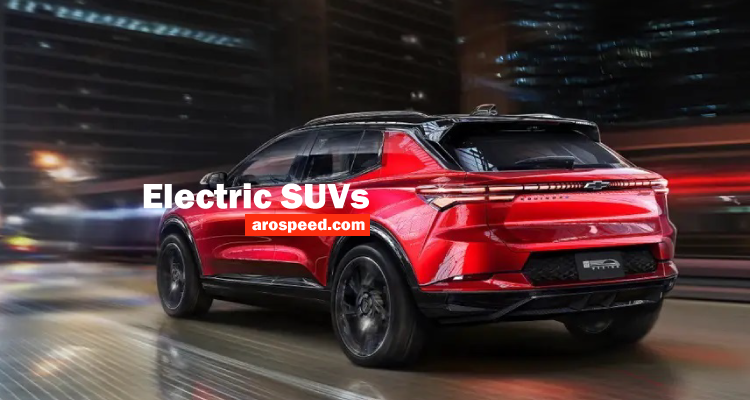The automotive industry is undergoing a significant transformation with the increasing demand for electric vehicles (EVs) to combat climate change and reduce dependency on fossil fuels. Among the various types of EVs, electric SUVs have emerged as a promising solution, blending sustainability with versatility and performance. This article delves into the phenomenon of electric SUVs, examining their rise, benefits, challenges, and future prospects in shaping the future of transportation.
| Model | Range (miles) | Power (kW) | 0-60 mph (seconds) | Seating Capacity | Cargo Space (cu. ft.) |
|---|---|---|---|---|---|
| Tesla Model X | 360 | 193 | 4.4 | 5-7 | 88 |
| Audi e-tron | 222 | 300 | 5.5 | 5 | 57 |
| Jaguar I-PACE | 234 | 294 | 4.5 | 5 | 25.3 |
| Ford Mustang Mach-E | 230-300 | 190-358 | 3.5-6.1 | 5 | 29 |
| Mercedes-Benz EQC | 259 | 300 | 5.1 | 5 | 19.4 |
Table of Contents
Note:
- Range is approximate and can vary based on driving conditions, battery size, and other factors.
- Power refers to the maximum power output of the electric motor(s) in kilowatts (kW).
- 0-60 mph acceleration time represents the time it takes for the vehicle to accelerate from 0 to 60 miles per hour.
- Seating capacity indicates the maximum number of passengers the vehicle can accommodate.
- Cargo space represents the available cargo volume with the rear seats folded down where applicable.
Here’s a basic pricing table for electric SUVs in different countries:
| Model | United States (USD) | United Kingdom (GBP) | Germany (EUR) | Canada (CAD) | Australia (AUD) |
|---|---|---|---|---|---|
| Tesla Model X | $89,990 | £82,980 | €95,990 | $115,990 | A$159,990 |
| Audi e-tron | $65,900 | £59,900 | €69,100 | $83,800 | A$120,000 |
| Jaguar I-PACE | $69,850 | £64,495 | €71,700 | $86,500 | A$123,300 |
| Ford Mustang Mach-E | $43,895 – $61,600 | £40,350 – £56,600 | €46,300 – €65,000 | $55,800 – $78,300 | A$79,950 – A$112,500 |
| Mercedes-Benz EQC | $67,900 | £64,950 | €69,900 | $84,800 | A$123,400 |
The Evolution of Electric SUV
Electric SUVs represent a convergence of two major trends in the automotive industry: the popularity of SUVs and the transition to electric propulsion. Traditionally, SUVs were associated with gas-guzzling engines and high emissions. However, advancements in electric vehicle technology have paved the way for eco-friendly alternatives without compromising on space, comfort, or utility.
Benefits of Electric SUVs
- Environmental Sustainability: Electric SUVs significantly reduce carbon emissions compared to their gasoline counterparts, contributing to cleaner air and mitigating climate change.
- Cost Savings: While the initial purchase price of electric SUVs may be higher, they offer lower operating costs due to cheaper electricity compared to gasoline and reduced maintenance requirements.
- Performance: Electric SUVs are known for their instant torque delivery, providing smooth acceleration and a responsive driving experience. Moreover, their lower center of gravity, thanks to the battery placement, often translates to better handling and stability.
- Versatility: Electric SUVs retain the spacious interiors and cargo capacity associated with traditional SUVs, making them suitable for families, outdoor enthusiasts, and urban commuters alike.
- Technological Innovation: Manufacturers are investing heavily in electric SUVs, leading to innovations in battery technology, autonomous driving features, and connectivity options, enhancing the overall driving experience.
Challenges and Considerations
Despite their numerous benefits, electric SUVs face several challenges that hinder their widespread adoption:
- Range Anxiety: While the range of electric SUVs has improved significantly in recent years, range anxiety remains a concern for consumers, especially for long-distance travel.
- Infrastructure for Charging: The widespread acceptance of electric SUVs depends on the development of infrastructure for charging them. Even though there has been improvement, issues like uneven pricing guidelines and restricted availability in some areas still exist.
- Cost and Affordability: While the overall cost of electric SUVs is decreasing, they still tend to have a higher upfront cost compared to conventional SUVs, limiting accessibility to a broader consumer base.
- Battery Life and Recycling: The longevity of batteries and the recycling of lithium-ion batteries pose environmental challenges. Efforts to improve battery durability and recycling processes are essential to minimize the environmental impact of electric SUVs.
- Regulatory Uncertainty: Government policies and regulations play a significant role in the adoption of electric vehicles. Uncertainty surrounding incentives, emissions standards, and infrastructure investments can affect consumer confidence and manufacturer strategies.
The Role of Electric SUVs in Reducing Carbon Emissions
Electric SUVs play a crucial role in reducing carbon emissions and combating climate change. By replacing traditional gasoline-powered vehicles with electric alternatives, emissions associated with transportation can be significantly reduced.
Electric SUVs have zero tailpipe emissions, which means that dangerous particles that cause respiratory illnesses and air pollution, such as carbon monoxide, nitrates, and fine particles, are eliminated. Moreover, when powered by renewable energy sources such as solar or wind, the overall carbon footprint of electric SUVs can be further minimized, making them an essential component of a sustainable transportation system.
Driving Innovation in Battery Technology
One of the key drivers of the electric SUV revolution is the continuous innovation in battery technology. Advances in battery chemistry, manufacturing processes, and energy density have led to significant improvements in the performance and range of electric vehicles, including SUVs. Lithium-ion batteries, which are the most common type used in electric vehicles, have seen steady improvements in energy density and durability, enabling electric SUVs to achieve longer ranges on a single charge.
Overcoming Range Anxiety Through Enhanced Battery Range
Range anxiety, the fear of running out of battery power before reaching a charging station, has been a significant barrier to the widespread adoption of electric vehicles, including SUVs. However, recent advancements in battery technology have helped alleviate this concern by increasing the range of electric SUVs.
Modern electric SUVs can now travel hundreds of miles on a single charge, offering comparable range to traditional gasoline-powered vehicles and providing drivers with the confidence to embark on long journeys without worrying about running out of power.
Expanding Charging Infrastructure for Convenience and Accessibility
The availability of charging infrastructure is critical to the adoption of electric SUVs. While home charging is convenient for daily commuting and overnight charging, public charging stations are essential for longer trips and to address range anxiety.
Additionally, innovative solutions such as wireless charging technology and vehicle-to-grid integration are being explored to further enhance the convenience and accessibility of charging for electric SUV owners.
Enhancing Driving Experience with Autonomous Features
Electric SUVs are not only environmentally friendly but also offer advanced technology features that enhance the driving experience. Many electric SUVs come equipped with autonomous driving capabilities, such as adaptive cruise control, lane-keeping assist, and automatic emergency braking, which improve safety and reduce driver fatigue.
Additionally, features such as over-the-air software updates allow electric SUVs to receive regular updates and improvements, ensuring that owners always have access to the latest technology and performance enhancements.
The Role of Government Policies and Incentives
Government policies and incentives play a significant role in driving the adoption of electric SUVs. Many countries and regions offer financial incentives such as tax credits, rebates, and subsidies to encourage consumers to purchase electric vehicles.
Additionally, regulations such as emissions standards and zero-emission vehicle mandates push automakers to invest in electric vehicle technology and expand their electric vehicle offerings. Furthermore, investments in charging infrastructure and research and development support from governments help accelerate the transition to electric mobility and pave the way for a sustainable transportation future.
Electric SUVs in the Global Market Landscape
The market for electric SUVs is rapidly expanding, driven by increasing consumer demand for sustainable transportation options and stringent emissions regulations worldwide. Leading automakers are investing heavily in electric SUVs, introducing new models with improved performance, range, and features to cater to diverse consumer preferences.
Additionally, new entrants and startups are entering the electric SUV market, bringing innovative designs and technologies that challenge traditional automotive incumbents. As competition intensifies and economies of scale drive down production costs, electric SUVs are becoming more affordable and accessible to a broader range of consumers, further accelerating the transition to electric mobility on a global scale.
Future Outlook
Despite the challenges, the future looks promising for electric SUVs. As technology continues to advance and economies of scale drive down production costs, electric SUVs are expected to become more affordable and accessible to a broader range of consumers. Additionally, initiatives aimed at expanding charging infrastructure and incentivizing electric vehicle adoption will further accelerate the transition away from internal combustion engines.
Conclusion
Electric SUVs represent a pivotal step towards sustainable transportation, offering a compelling combination of environmental benefits, performance, and versatility. While challenges such as range anxiety, charging infrastructure, and cost remain, ongoing advancements in technology and supportive government policies are driving the rapid growth of electric SUVs. As consumers increasingly prioritize sustainability and automakers respond with innovative electric offerings, electric SUVs are poised to play a central role in shaping the future of mobility.








Comments